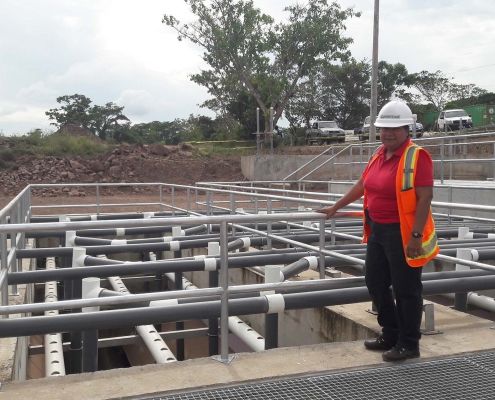Nicaragua

Nicaragua is making a major commitment to the development of the water and sanitation sector. Since 2013, the public institutions responsible have been implementing the Comprehensive Sectoral Programme for Water and Human Sanitation (PISASH). This effort is expected to provide drinking water services to 95% of the population in urban and peri-urban areas and 56.5% of the population in rural areas by 2023. Likewise, sanitation coverage is expected to rise to 80% in urban areas and 52% in rural areas.
Spanish Cooperation, and in particular AECID, through the Cooperation Fund for Water and Sanitation, has made a special contribution to this task. Spain is one of the main donors helping to promote basic services in the water and sanitation sector for the benefit of the Nicaraguan population. It currently has a portfolio of three programmes in the country, two bilateral and one implemented jointly with the Inter-American Development Bank (IDB). Overall, the FCAS contribution to PISASH totals 60.2 million euros, plus a further 3.2 million euros from the Spain-Nicaragua Debt Conversion Programme.
In addition, the programmes financed by Spain have made it possible to leverage more funds for the promotion of the first phase of PISASH. The EU has provided another €50 million donation through the Latin America Investment Facility (LAIF), which is managed by the AECID in the form of delegated cooperation. This is in addition to the Nicaraguan government’s own resources and those resulting from a loan from the Central American Bank for Economic Integration (CABEI) and another from the European Investment Bank (EIB). All this adds up to a total of 314 million euros to implement Phase I of PISASH in urban areas under the leadership of the Nicaraguan Water and Sewerage Company (ENACAL).
This intervention has a direct impact on 19 cities. It also finances the implementation of pre-investment projects in 17 additional cities. In fact, Phase II of PISASH is already a reality, with a budget of an additional 578 million dollars provided by the IDB, CABEI, the State Development Bank of the Federal Republic of Germany (KfW) and South Korea.
More information
This year, in 2020, the implementation period of the bilateral grant in Chontales came to an end, with all the resources disbursed and the objectives achieved. This grant served to improve access to drinking water in the cities of Acoyapa, Santo Tomás and Bluefields, and sanitation in the first two, installing a total of 9,350 new drinking water connections and 4,600 sanitation connections. In addition, the grant enabled capacity building for the operation and maintenance of the newly installed systems. The sanitation systems of nine public schools in Acoyapa and Santo Tomás have also been improved, and a plan to connect 1,100 vulnerable families in both cities to the sanitary sewerage system has been financed.
Meanwhile, through the other FCAS bilateral grant NIC-013-B, work continued on the construction of the Masaya Wastewater Treatment Plant (WWTP), which should be completed in 2021 for entry into operation of the entire new sanitary sewerage and sanitation system of this city.
Under the multilateral programme NIC-056-M, promoted together with the Inter-American Development Bank (IDB), work has been completed on the new drinking water system in the city of Bilwi, which will improve the living conditions of around 60,000 people. As of 31 December, the collection, the drinking water treatment plant, the household connections and the Regional Care Centre (CRAI) were in the final stages of implementation and will be completed during the first half of 2021.
Through the Delegated Cooperation Agreement with the EU, the LAIF grant is also progressing towards completion of all its components. In the course of 2021, only the project for the extension of sewerage networks in the city of Bilwi, which is the result of the savings produced through managing the grant and which allows for the installation of 2,892 new connections in addition to those installed in the original project already completed, amounting to a total of 6,451 connections, remains to be completed.
At the end of 2019, the AEICD and the EU signed a new Contribution Agreement to finance the project “Improvement of the drinking water service in the sector of Altamira – Managua with a focus on sustainability and equity”, for an amount of 10 million euros, to be implemented by ENACAL. In 2020, work was carried out on the structure and planning of the programme, which will be developed over the next 42 months. This project will help 43,224 homes have access to a 24-hour drinking water service, with a 15.15% reduction in unbilled water, increasing collection to 90% by 2023. Likewise, at the end of the project, 30,257 families are expected to have adopted hygiene and sanitary behaviour changes related to the rational use of water.

